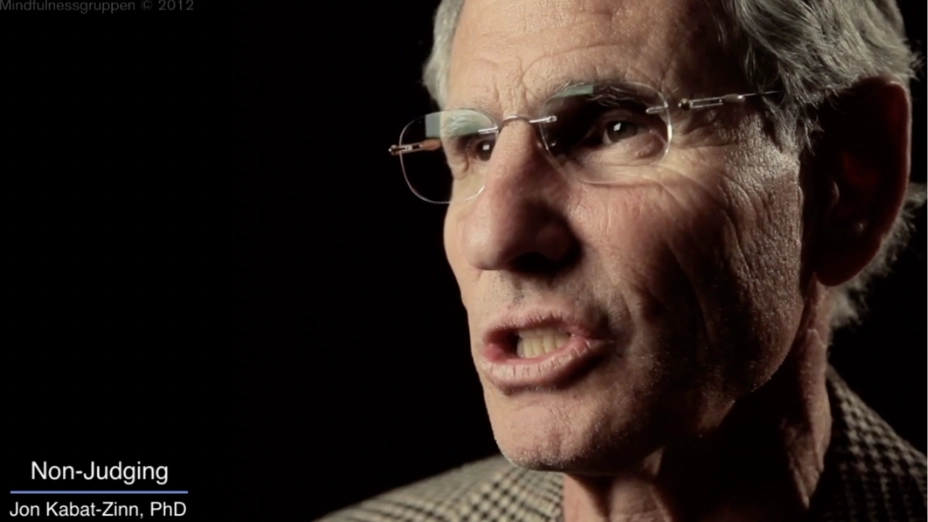從態度開始的正念修習
石世明中譯
2025/4/8
培養「當下的、不加評判的覺察」——聽來似乎很簡單,實際上卻是人生中最困難的功課之一。我們的心容易被慣性與舊有經驗主導,難以真正清楚地看見當下正在發生的事。2025/4/8
當我們練習正念時,帶入某些特定的「態度」是至關重要的。它們幫助我們不去強求、也不追逐特定結果,而是單純地與當下相處。這些態度不僅能支持我們的正練修習練習,也能融入日常生活,改善我們與自己、與他人、與世界的關係。
Jon Kabat-Zinn 最初在《正念療癒之道》一書中提出了七種正念態度,後來補充為九種。每一種態度都是一扇門,通往正念的核心,也通往我們內在更廣闊的生命智慧。
2. Non-Judging 不評價
Non-judging is a very important element of mindfulness practice and is part of my working definition of mindfulness: the awareness that arises through paying attention on purpose in the present moment non-judgmentally. And the non-judgmentally is the real challenge because when you start to pay attention to what's on your mind, you rapidly discover that we have ideas and opinions about everything.
「不評判」是正念練習中非常重要的一個面向,事實上,它也是我對正念的實務定義之一:正念是一種刻意地將注意力放到當下,並且不帶評判,所生起的覺察。然而「不評判」本身其實是個極大的挑戰—因為當我們開始觀察自己的念頭時,很快就會發現:我們對幾乎所有事情,都有看法與意見。
We're always judging things in terms of: I like that, I don't like that, I want that, I don't want that, this is good, that's bad. And it's like a steady stream of judging—judging, judging, judging, judging. So when we speak of mindfulness as being non-judgmental awareness, it doesn't mean that there won't be judgments. It means that you will be aware of how judgmental we actually are, and then not judge the judging. That’s the key.
我們總是以「我喜歡這、不喜歡那」、「我想要這、不想要那」、「這是好的、那是壞的」來評斷事物。這彷彿是一股持續不斷的評判之流——評斷、評斷、評斷、不停地評斷。所以,當我們說正念是一種「不評判的覺察」,並不表示心中不會有任何評斷,而是我們開始覺察到:自己其實非常習慣下評斷,並且學著不去評斷那些正在發生的評斷。這,就是關鍵所在。
When we relate to it in that kind of a way, we begin to see that our judging is very often black and white. It's either this or that—good or bad, like or dislike, want or don't want—and we get imprisoned by that kind of view. But being non-judgmental doesn’t mean that all of a sudden you get stupid and think, “Well, I'm not going to be judgmental, so I'll just walk out into the street in front of an oncoming truck. What difference does it make?” No. It means that we will cultivate discernment—this is the capacity to see what's actually unfolding, but not to judge it, rather to recognize it and understand it in relationship to our experience.
當我們以這樣的方式來看待評斷時,會開始發現:我們的評判往往是非黑即白的,不是這樣,就是那樣;不是好,就是壞;不是喜歡,就是討厭;不是想要,就是不想要—我們常常被那樣的觀點困住。但「不加評判」並不代表你會突然變得愚蠢,像是在想:「既然我不該評斷,那我就走到馬路上,讓迎面而來的卡車撞上—反正有什麼差別呢?」不,真正的意思是:我們要培養一種分辨力—這是一種能夠如實看見事情正在發生的能力,不是對評斷它下,而是去辨識它、理解它,並把它放回我們的經驗脈絡中。
So when we speak about non-judgmental awareness, that's what we're talking about. We're talking about a very fine degree of discernment, of clarity, of wisdom, of understanding the interconnections between things. And at the same time, noticing the tendency to judge quite quickly—like, don't like, want, don't want—and to recognize that that actually creates a kind of veil or a filter in front of our eyes that doesn't allow us to see things as they are, but only see them through the lenses of our own ideas, opinions, likes and dislikes— which is practically blinding to us.
所以,當我們談到「不評判的覺察」時,說的正是這一點:這是一種極為細緻的分辨力——帶著清明、智慧,及對事物之間相互連結的理解。同時,我們也要留意自己很容易落入評斷的傾向,像是喜歡、不喜歡,想要、不想要,並進一步辨識出,這樣的傾向實際上會在我們眼前形成一道面紗或濾鏡,使我們無法如其所是地看見事物,只能透過自己的想法、意見與好惡來看待它們——這幾乎讓我們看不見真相。
So this is a wonderful discipline: the cultivation of awareness of judging, and the cultivation of being gently non-judgmental, or not judging the judging that we do discover in ourselves. And over days, weeks, months, and years, we can begin to actually find a way to navigate through our judging in such a way that it no longer dominates our lives in quite the same way. And we recognize, when it comes up, that it's actually—in some sense—toxic. And the more we challenge it, and the more we rest in discernment and in pure awareness, the more we can live life authentically in the present moment, without getting caught by our own habits of mind—unhealthy, if you will, habits of mind.
因此,這是一項極有價值的修練:培養對評斷的覺察,同時練習以溫和、不加評判的態度對待它,或者說——對自己發現的那些評斷,不再加以評斷。隨著日、週、月、年的持續練習,我們會逐漸找到一種方式,學會在評斷之中前行,讓它不再以同樣的方式主宰我們的生活。當評斷再次出現時,我們也會認出它,其實在某種程度上是具有毒性的。而我們越是溫柔地面對它、越是安住於分辨與純然的覺察中,就越能真誠地活在當下,不再被自己習慣性的思維模式——尤其是那些不健康的模式——所困住。
「不評判」是正念練習中非常重要的一個面向,事實上,它也是我對正念的實務定義之一:正念是一種刻意地將注意力放到當下,並且不帶評判,所生起的覺察。然而「不評判」本身其實是個極大的挑戰—因為當我們開始觀察自己的念頭時,很快就會發現:我們對幾乎所有事情,都有看法與意見。
We're always judging things in terms of: I like that, I don't like that, I want that, I don't want that, this is good, that's bad. And it's like a steady stream of judging—judging, judging, judging, judging. So when we speak of mindfulness as being non-judgmental awareness, it doesn't mean that there won't be judgments. It means that you will be aware of how judgmental we actually are, and then not judge the judging. That’s the key.
我們總是以「我喜歡這、不喜歡那」、「我想要這、不想要那」、「這是好的、那是壞的」來評斷事物。這彷彿是一股持續不斷的評判之流——評斷、評斷、評斷、不停地評斷。所以,當我們說正念是一種「不評判的覺察」,並不表示心中不會有任何評斷,而是我們開始覺察到:自己其實非常習慣下評斷,並且學著不去評斷那些正在發生的評斷。這,就是關鍵所在。
When we relate to it in that kind of a way, we begin to see that our judging is very often black and white. It's either this or that—good or bad, like or dislike, want or don't want—and we get imprisoned by that kind of view. But being non-judgmental doesn’t mean that all of a sudden you get stupid and think, “Well, I'm not going to be judgmental, so I'll just walk out into the street in front of an oncoming truck. What difference does it make?” No. It means that we will cultivate discernment—this is the capacity to see what's actually unfolding, but not to judge it, rather to recognize it and understand it in relationship to our experience.
當我們以這樣的方式來看待評斷時,會開始發現:我們的評判往往是非黑即白的,不是這樣,就是那樣;不是好,就是壞;不是喜歡,就是討厭;不是想要,就是不想要—我們常常被那樣的觀點困住。但「不加評判」並不代表你會突然變得愚蠢,像是在想:「既然我不該評斷,那我就走到馬路上,讓迎面而來的卡車撞上—反正有什麼差別呢?」不,真正的意思是:我們要培養一種分辨力—這是一種能夠如實看見事情正在發生的能力,不是對評斷它下,而是去辨識它、理解它,並把它放回我們的經驗脈絡中。
So when we speak about non-judgmental awareness, that's what we're talking about. We're talking about a very fine degree of discernment, of clarity, of wisdom, of understanding the interconnections between things. And at the same time, noticing the tendency to judge quite quickly—like, don't like, want, don't want—and to recognize that that actually creates a kind of veil or a filter in front of our eyes that doesn't allow us to see things as they are, but only see them through the lenses of our own ideas, opinions, likes and dislikes— which is practically blinding to us.
所以,當我們談到「不評判的覺察」時,說的正是這一點:這是一種極為細緻的分辨力——帶著清明、智慧,及對事物之間相互連結的理解。同時,我們也要留意自己很容易落入評斷的傾向,像是喜歡、不喜歡,想要、不想要,並進一步辨識出,這樣的傾向實際上會在我們眼前形成一道面紗或濾鏡,使我們無法如其所是地看見事物,只能透過自己的想法、意見與好惡來看待它們——這幾乎讓我們看不見真相。
So this is a wonderful discipline: the cultivation of awareness of judging, and the cultivation of being gently non-judgmental, or not judging the judging that we do discover in ourselves. And over days, weeks, months, and years, we can begin to actually find a way to navigate through our judging in such a way that it no longer dominates our lives in quite the same way. And we recognize, when it comes up, that it's actually—in some sense—toxic. And the more we challenge it, and the more we rest in discernment and in pure awareness, the more we can live life authentically in the present moment, without getting caught by our own habits of mind—unhealthy, if you will, habits of mind.
因此,這是一項極有價值的修練:培養對評斷的覺察,同時練習以溫和、不加評判的態度對待它,或者說——對自己發現的那些評斷,不再加以評斷。隨著日、週、月、年的持續練習,我們會逐漸找到一種方式,學會在評斷之中前行,讓它不再以同樣的方式主宰我們的生活。當評斷再次出現時,我們也會認出它,其實在某種程度上是具有毒性的。而我們越是溫柔地面對它、越是安住於分辨與純然的覺察中,就越能真誠地活在當下,不再被自己習慣性的思維模式——尤其是那些不健康的模式——所困住。


